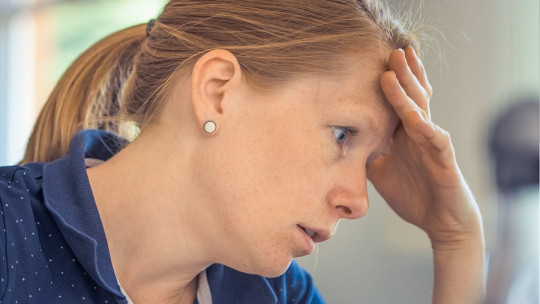Currently, problems when trying to conceive a baby are more frequent that a few decades ago; This is probably due above all to the tendency to postpone the moment when planning to start the first pregnancy, given that fertility drops significantly in the last stage of youth.
However, the reasons why many women cannot get pregnant go beyond the purely biological, and enter the realm of psychology. In cases like this, there is usually an emotional obstacle to take into account: anxiety.
Pressure and anxiety to get pregnant
Anxiety is a phenomenon that is present, to a greater or lesser extent, in most psychological problems. For example, a high percentage of people diagnosed with depression also present anxiety disorders (although apparently both seem to operate through very different, almost opposite logics), and the same occurs with disorders such as addictions, insomnia, post-traumatic stress, etc.
In fact, the scope of influence of excess anxiety is so broad that it also encompasses problems considered medical or biological: the difficulty in conceiving a son or daughter, the case at hand, is an example of this.
Why is this happening? The first thing to be clear about is that the distinction between psychological problems and medical problems is basically a mirage. A mirage that helps us understand reality through simplified explanations, but a mirage nonetheless.
Almost everything that happens in a person’s living body has a biological and a psychological facet , because both are interconnected realities, they are part of the same thing. However, sometimes we are interested in putting more focus on one of them. That is why it is understood that anxiety problems are something with biological and psychological implications, and both favor the appearance of difficulties in achieving a pregnancy.
Biological problems conceiving linked to anxiety
Here we will focus on the case of people who, despite not having medical illnesses that prevent them from having a baby, experience difficulties conceiving, mainly caused by anxiety.
When we feel very anxious, our body mobilizes resources to react as soon as possible to possible dangers or opportunities that could appear at any moment in our path. This It does so by sacrificing functions that provide benefits in the medium or long term. and of course, the possibility of having a baby is one of them.
Thus, for example, it has been seen that even in pregnancy processes that do not end in miscarriage, the existence of high levels of anxiety during pregnancy significantly increases the chances of developing health problems such as preeclampsia, as well as having premature births, as well as having babies with less weight than normal and/or with a smaller head circumference, or more prone to developing psychopathologies and psychiatric disorders as they grow, for example.
In the same way, The presence of high levels of anxiety greatly weakens the immune system, and gives way to abnormal hormone production. , which have very varied effects both psychologically and on the functioning of organs and cellular tissues distributed throughout the body. The consequences of this are to a certain extent unpredictable and vary greatly from person to person, but they are generally associated with a deterioration in health, which has an impact on fertility and the viability of pregnancies.
Psychological problems in conceiving linked to anxiety
As we have seen, excess anxiety has a biological facet, and now it is time to understand its psychological facet a little better in relation to the way in which it affects the ability to conceive a baby.
The first aspect to keep in mind is that anxiety is a phenomenon capable of making us enter a loop of problematic behaviors that predispose us to continue feeling anxious. In this case, A clear example is that of the woman who believes that it will be very difficult for her to have a baby and because of this she begins to get stressed. and to try to control every aspect of their life to try to conceive and ensure that the pregnancy goes well. The mix between a hyper-vigilant attitude and the fear of failure brings these people closer to not achieving their goals due to involuntary self-sabotage.
For example, the mental wear and tear caused by anxiety frequently leads to insomnia problems, or to the adoption of inappropriate eating patterns, or to self-induced moments of stress by thinking over and over again about catastrophic situations that could theoretically happen to us. All of these experiences not only cause anxiety to continue accumulating, but they themselves constitute problems that, on their own, are capable of lowering the chances of the pregnancy going well.
On the other hand, in the case of women, we must not forget a potential source of stress that comes almost “as standard”: social pressure and expectations from family and loved ones , eager for everything to go perfectly. The female role is strongly linked to reproduction and the ability to have children, so for many women the possibility of being unable to have babies is almost an existential crisis that generates stress.
To do?
The ideal thing to prevent pressure and stress from impacting your ability to have a viable pregnancy is have professional support from psychologists. However, in addition to this, there are a series of habits and routines that usually help if we incorporate them into our daily lives. This is a summary:
Are you looking for psychological support?

If you are experiencing problems conceiving and believe that part of the causes are psychological, I invite you to contact me. I am a psychologist with many years of experience in using the cognitive-behavioral intervention model, one of the most effective and scientifically validated. You can count on my professional support both in my office located in Madrid and through online sessions by video call. On this page you will find more information about my way of working, and my contact information.









